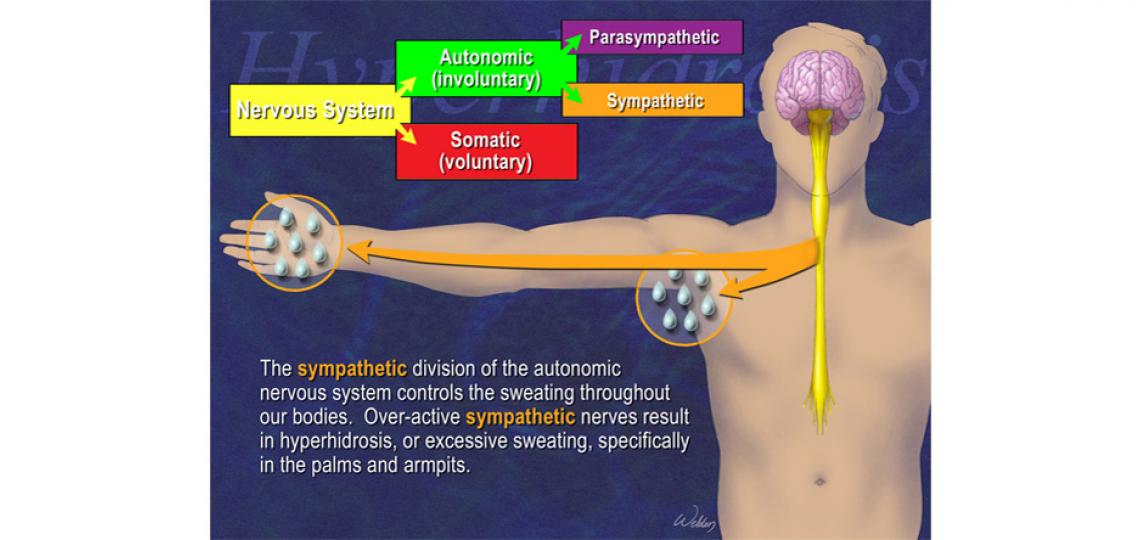Ideal Dermatology Approaches for Sweaty Hands Treatment: Tips and Techniques
Ideal Dermatology Approaches for Sweaty Hands Treatment: Tips and Techniques
Blog Article
Recognizing the Origin of Excessive Sweating and Its Effect on Every Day Life
Excessive sweating, additionally known as hyperhidrosis, is a condition that influences a significant portion of the population, yet its underlying reasons and ramifications on day-to-day working continue to be rather enigmatic. While it is commonly comprehended as a physiological response to regulate body temperature, the triggers for extreme sweating can vary widely amongst people, incorporating not just physical elements however emotional and also psychological aspects. The impact of this condition prolongs beyond simple discomfort, commonly affecting social interactions and total top quality of life. By diving into the source of hyperhidrosis and discovering its complex results, a much deeper understanding of this prevalent issue can be obtained, clarifying the intricacies that people facing extreme sweating browse every day.
Physiology of Sweat Glands
The regulation of sweat manufacturing, an essential physical process, is primarily controlled by the task of gland distributed throughout the human body. Gland are categorized into two main types: eccrine and apocrine glands. Eccrine glands are one of the most countless and are located in mostly all locations of the body. They play an important role in thermoregulation by producing a watery fluid onto the skin's surface area, which vaporizes and assists cool down the body down. On the other hand, apocrine glands are focused in locations rich in hair follicles, such as the underarms and groin, and their secretions are thicker and milky in look.
When the body temperature level rises, either due to exercise, heats, or emotional stress and anxiety, the nerve system sets off the gland to produce sweat. This sweat is made up mostly of water and electrolytes like salt and chloride. The process of sweat manufacturing is important for preserving the body's inner temperature level within a slim, ideal variety, highlighting the important role sweat glands play in human physiology.
Triggers for Excessive Sweating
In understanding the origin of too much sweating, it is essential to determine the triggers that can cause this physical action. Extreme sweating, likewise called hyperhidrosis, can be motivated by numerous aspects, both physical and environmental. One usual trigger is emotional anxiety or anxiety, which can boost the body's gland to produce even more sweat than is needed for cooling down. Physical effort, heats, and spicy foods are additionally known to activate excessive sweating in people prone to this problem. Moreover, specific clinical problems like diabetic issues, hyperthyroidism, or menopause can contribute to extreme sweating as well.
Furthermore, drugs such as some antidepressants, opioids, and particular supplements can likewise function as triggers for hyperhidrosis. Recognizing these triggers is vital in taking care of too much sweating effectively - How to stop sweaty hands. By recognizing and attending to the particular triggers that trigger excessive sweating in a private, doctor can develop tailored treatment plans to ease this condition and improve the person's quality of life
Medical Issue Associated
Associated with excessive sweating are numerous clinical problems that can imp source intensify this physical reaction. One typical condition is hyperhidrosis, a problem defined by extraordinarily enhanced sweating that surpasses the body's thermoregulatory needs. This can manifest in focal locations like the palms, soles, underarms, or face, influencing an individual's high quality of life due to social embarrassment and discomfort.
In addition, endocrine disorders such as hyperthyroidism, diabetes mellitus, and menopausal hot flashes can likewise result in too much sweating. Hyperthyroidism triggers an overflow of thyroid hormonal find more information agents, speeding up metabolic rate and activating sweating. Diabetes can induce sweating episodes, especially during hypoglycemic episodes when blood sugar level levels drop too reduced. Menopausal hot flashes, attributed to hormonal fluctuations throughout menopause, can cause abrupt and intense sweating, commonly accompanied by flushing and heart palpitations.
Additionally, infections like endocarditis, hiv, and consumption have actually been associated with evening sweats, a common sign known to interfere with sleep and impact general well-being. These medical conditions highlight the varied series of underlying elements that can add to excessive sweating, necessitating complete assessment and monitoring by medical care professionals.
Mental and psychological Elements

Effect on Social Communications
Extreme sweating can have profound impacts on a person's ability to engage easily in social interactions. The noticeable indicators of sweat stains or wet patches on apparel can bring about humiliation and self-consciousness, causing people to withdraw from social circumstances. This withdrawal can affect relationships, restriction social activities, and prevent personal and expert growth.

Moreover, the anxiousness and self-worth concerns coming from excessive sweating can impact interaction and interpersonal skills. People might struggle to concentrate on conversations, participate in group tasks, or share themselves with confidence. This can cause sensations of isolation and isolation, as social links end up being challenging to keep.
Conclusion

While it is typically recognized as a physiological action to manage body temperature, the triggers for extreme sweating can differ widely among people, including not only physical aspects yet also emotional and mental aspects. By delving right into the origin causes of hyperhidrosis and exploring its diverse effects, a much deeper understanding of this prevalent problem can be gained, dropping light on the complexities that individuals grappling with excessive sweating browse on an everyday basis.
Physical exertion, high temperature levels, and spicy foods are additionally known to trigger excessive sweating in people prone to this condition. By determining and attending to the particular triggers that motivate extreme sweating in an individual, health care providers can develop customized treatment strategies to minimize this condition and improve the person's quality of life.
Too much sweating can have extensive impacts on an individual's ability to engage easily in social communications.
Report this page